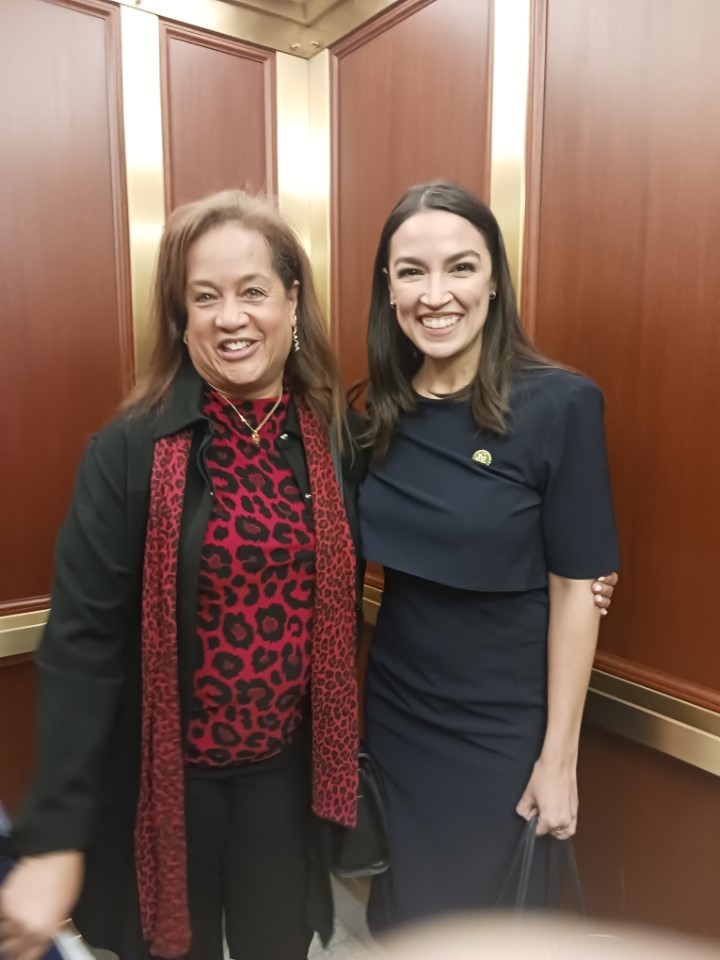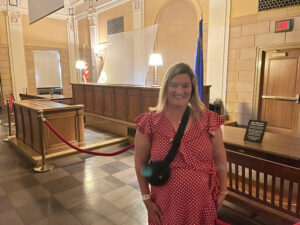Debra Flamer is a returning court reporter and longtime NCRA member. She was featured in films such as Philadelphia and recently attended the 2023 NCRA Leadership & Legislative Boot Camp and took to the Hill to advocate for her profession (pictured during an elevator pitch with N.Y. Rep. Alexandria Ocasio-Cortez). Ms. Flamer was kind enough to grant an interview to the JCR Weekly on a variety of topics regarding her personal experiences and what she sees happening professionally in the near future.
JCR | What made you return to this career field?
DF| What made me return to this career field is perhaps threefold: I have twin granddaughters whom I cared for in my home while my son and daughter-in-law worked. After they turned two, as a family we agreed they would benefit from being in a setting where they could socialize with other children and we looked for a childcare worker who had an in-home, loving and nurturing environment where my granddaughters would thrive. We found a neighbor of my son’s who became their daycare provider and thus I was free to return to the career I loved.
I started back in after three years of retirement from my second officialship and began scoping for an excellent Realtime reporter from Philly who used to be my officemate. In doing so, I loved the research I would do on her cases as she was Real Teaming me from commerce court or had a medical daily job – I always loved the research aspect of the profession, learning so many new things! While doing that I thought, why don’t I call the courts I worked for (Philadelphia and Montgomery counties) and see if they could use a per diem reporter. They certainly welcomed me back with open arms and I purchased the latest Catalyst software and the Luminex II and was ready to rock and roll again!
I returned because I truly believe court reporting is just in my DNA.
JCR | Has the industry changed much or enough in the time you retired and returned?
DF | I only have seen positive changes in the industry since I retired and returned, that being the better technology with the CAT software systems and the ability to do great things like Real Team and keyless entry into your programs, iCloud capabilities to store notes, newer and improved writers, great online forums and Zooming capabilities (a lot due to the pandemic forcing us to be remote). There are more learning resources available to watch via YouTube and NCRA webinars. It’s great!
JCR | What would you say to those currently considering returning or pursuing this career field?
DF | What I would like to say to those returning or pursuing this career field is “Go for it!” This profession is so rewarding. It is lucrative. It will allow you to live a very comfortable lifestyle. It gives you access to a higher level of learning opportunities and vocabulary. You will have the opportunity to travel if you so desire and attend Conferences and seminars and to meet and bond with folks. The real camaraderie with others in the field is awesome!
JCR | How has being a member of NCRA impacted you professionally?
DF | Being a member of NCRA in my formative years enabled me to prepare and test for the RPR certification test which afforded me the opportunity to work as an official court reporter in Pennsylvania, Philadelphia County, as that was a requirement for the position at City Hall. Being a member of NCRA and attending the annual Conferences allowed me to learn so many job-related topics that tremendously impacted every aspect of my court reporting career.
JCR | Will you be joining members in Houston for the NCRA Conference & Expo this year?
DF | Absolutely!
JCR | Are there any tips or tricks of the trade you’d like to impart onto newcomers?
DF | One thing I find helpful to me is going to my job, be it freelance or as an official, with a positive and professional attitude! I like to introduce myself to the court staff and judge and attorneys (I work per diem so it’s different each day). I find it helpful to ease into a conversation to kind of set the tone for the day. This requires being ahead of the scheduled time.
That, to me, is most important because being early gets you ahead of the game with any names, words, phrases you might expect.
JCR | How do you define the role of a court reporter?
DF | I define the role of a court reporter as the most important person in the room – well, that’s what I’m told by the judges who make that announcement in open court so as to keep the attorneys in check by asking them to speak loudly and clearly. My role is to take them down verbatim, and to be calm and polite if I have to ask them to repeat something or to slow down or if I can’t understand a witness. My primary goal is to be “guardian of the record” and produce an excellent transcript.
JCR | Where do you see the court reporting and captioning field headed? How do you see this industry thrive and survive?
DF | I see and have always seen the captioning field and court reporting field continuing to be the best way to capture the spoken word for preservation and future referencing. It is the most accurate way of preserving history and the spoken word, in my opinion, as long as we as reporters maintain our gold standard values including professionalism, accuracy, and expediency in producing the record. In my watching the cable news networks (I’m a news junkie), court reporters are rocking it with delivering daily copy transcriptions for the news stations to read and refer to for the viewers and for trials currently taking place. I’ve seen kudos given by news reporters to court reporters on national TV, thanking them for the prompt transcripts sent to the news station. And, the awesome services that the captioners and CART providers are putting forth to aid the deaf and hard of hearing will keep us in demand.
JCR | Where has your career taken you?
DF | I would need a whole book to tell you where my career has taken me, but I’ll try to be brief here and perhaps write a book (smile).
I have had one-half a million dollars (got your attention) completely covered for my then 17-month-old daughter’s health issues because I was able to work as an official court reporter with great benefits back at that time. My daughter had a rare blood disease not ever seen in a person under the age of 30 and she was hospitalized for approximately three months before she was diagnosed at the Childrens’ Hospital of Pennsylnia (CHOP). She needed a bone marrow transplant and my then two-plus year-old son was her donor match. My daughter’s case ended up being a case study and CHOP picked up the expenses for what my job insurance did not cover. Today, my now 36-year-old daughter is a tech manager for a major tech company where she gets to travel the world; and my 38-year-old son is a manager of a company, now married and is the one who has blessed me with the twin granddaughters – well Jen, his wife actually gave birth (smile). So there’s that.
Next, through NCRA I was able to go to China at the time through their People-to-People program where a group of us went to collaborate with the court reporters from China and visited with them and had an awesome 15-day learning experience! I even was dared to eat a scorpion, and I did it.
Next, I had a role as a – wait for it – court reporter in the movie Philadelphia with Tom Hanks and Denzel Washington, directed by the late Jonathan Demme (Silence of the Lambs) who let me bring my kids on the set. I brought an autograph book along and all of the actors signed it. I had a speaking part that landed on the cutting room floor. It was “Just a moment; one at a time, one at a time.” There was a point in the courtroom scene where Mary Steenburgen and Denzel Washington (attorneys) were talking over each other, and I had a perplexed look on my face. The director came up to me during the shoot and said, Why are you looking like that? I profusely apologized and said, “Because in my courtroom the attorneys wouldn’t be speaking over one another. I’d have to take control of that and say one at a time.” He laughed and said, Okay, we’re going to put that into the scene.
But like I said, it landed on the cutting room floor but I was told by the actors that because my voice was on tape, I could get a contract, so they made me an honorary member of SAG and I get residuals … all because I was in my courtroom at lunchtime editing a transcript and the film crew came in and said they were using our courtroom to film this movie and they said they needed a court reporter. I was busy, so I threw them my business card and kept on editing my transcript. Well, next day, my judge came in and says, Debbie, what did you do? They want you to be in their movie for six weeks and are using my court reporter and courtroom! But then the judge calmed down and said if you want to do it, okay, Court Administrator will send me a substitute reporter. The rest is history for my fifteen minutes of fame.




